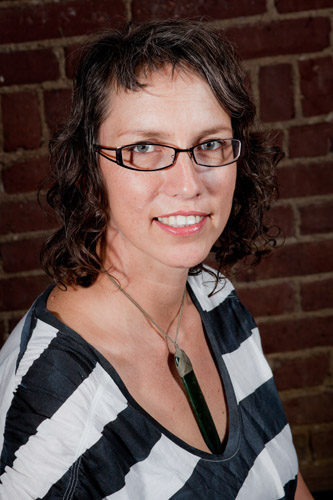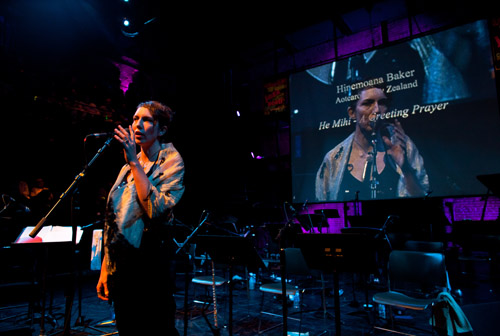Hinemoana Baker: The Page and the Stage
by Jen Lue / October 11, 2010 / No comments

Hinemoana Baker at the Jazz Poetry Concert, Photo © Renee Rosensteel
In “Our Children Have Run Away to Fiji” New Zealand poet Hinemoana Baker writes, “When they get there they make entirely/ different noises. This one used to sound human, like a laugh/ now there is more of a yawn to him in the mornings/ a knock, a vernacular; a measurement known mainly to those/ who live in America or Australia. But they were so human to us!/ Now they are so much more, so much has changed.”
In her lyrical poetry, Baker reveals her love of sound and of language. She writes in both official languages of New Zealand, English and Maori, an indigenous language that has been preserved from extinction by recent efforts by Maori leaders and supporters.
In her second collection of poetry, Kōiwi Kōiwi | Bone Bone, Baker combines a dedication to biculturalism with strong elements of humor, wit, and autobiography. She uses personal reflection to unpack the hidden meaning behind everyday moments, where an instant of mistaken identity between two strangers can become a larger comment on different societal expectations on men and women. Baker’s lyricism stems in part from her work as a successful singer and songwriter.
Currently Baker is participating in the University of Iowa’s International Writing Program. She recently performed her music and poetry at the 2010 City of Asylum/Pittsburgh Jazz Poetry Concert alongside Oliver Lake’s Big Band and writers Yusef Komunyakaa (USA), Khet Mar (Burma), Horacio Castellanos Moya (El Salvador), and Maryja Martysevich (Belarus).
In this interview, Baker talks about the tension between Maori-speaking and English-speaking culture, the pressure to reduce your identity to a simple label, and what it means to communicate with her higher self.
In your poetry, you use both English and Maori. What is your relationship to the Maori language?
Like most people in New Zealand who speak Maori, I didn’t learn it at my Nanna’s knee. I learned it at university. That’s slowly changing because there’s been a huge renaissance in Maori language and culture in the last 25 years.
I’m not, by any means, a fluent speaker but I really love it. It couldn’t be more different from English, both culturally and linguistically. I find that tension really satisfying. I’m constantly surprised, in a good way, by the differences.
How would you describe those linguistic differences?
I once heard it said that English is very good at defining the absolute, finite details about how things are different from each other, whereas Maori is very good at finding commonalities. In Maori, it’s not as possible to be clear about the ways in which we differ or disagree. It’s just not the same in English, which probably reflects the difference in the ethics of English culture and the ethics of Maori culture as well.
As a writer do you feel pressure to identify as either Maori or non-Maori?
The vast majority of Maori New Zealanders also have non-Maori heritage. However, I still feel a pressure—perceived or real—to choose, but I don’t choose. I consciously say that I’m both and aim to be as proud or ashamed of both. I’ve always been a person who doesn’t really fall into either camp and so I fall between the cracks a little bit, in terms of everything from how I live my life and what events I attend to what kind of government funding I receive.
In addition to being a poet and a writer you are also a successful singer, musician, and sound producer. What do you see as the relationship between songwriting and poetry in your work?
Lyrics need a lot more help to come alive. Poems have to perform on the page, they don’t get help from music. When Jan Beatty interviewed me on the radio for Prosody, WYEP’s poetry program, she said, “When you read I hear this rhythm and this pace going on. Is that a New Zealand language thing? Or a Maori thing?” I think it’s because I’m a musician. I don’t know if that’s happening on the page for people when they’re just reading it but I hope so. I think there is some conversation happening there.
Your first book, matuhi | needle is accompanied by Maori artwork and a CD featuring you reading poems and singing. What went into the decision to include these elements?
The book was published with the help of the actor Viggo Mortensen, and he was really interested in doing a book combining work by Maori artists and poets. Viggo was living in New Zealand, mostly in Wellington, for about two or three years making Lord of the Rings. By the end of it he really loved Wellington and wanted to give something back to the city. He approached me and said, “I’d like to publish your book.”
When he said, “Would you like a CD in the back?” I said, “Okay, let’s do that.” I know a number of people who are either dyslexic or have some sort of visual impairment. They listen to poetry a lot rather than read it. I thought the CD was a great opportunity and, because I was working on my first album at the time, I thought I would add a track or two from that. It was all fairly hasty and we probably could have done it better but it does mean that I have this amazing object. I was the most hated poet in New Zealand after it was published.
Do you have any recommendations for readers who are interested in contemporary New Zealand literature?
In terms of our literature, our poetry is really strong. A good place to start is a website called Best New Zealand Poems, published by the International Institute of Modern Letters and supported by Victoria University Press. There’s also the New Zealand Book Council which has a massive amount of links to various other places.
How would you describe the reception of poets and authors in New Zealand today?
It would be safe to say that we haven’t been a country that really embraces and celebrates our artists as much as we celebrate and embrace our rugby players. I think that’s slowly changing. We do have a bit of an attitude, that thing of like, “Well, what do you do?” or “What are you actually doing?” When I do residencies, there is a sense of, “Will you just get a real job? A job that we can understand?” That’s probably the case around the world, but particularly in New Zealand.
Does the push towards social acceptance in the job sphere translate to other parts of your life?
It’s similar also in terms of my sexuality; I’ve had relationships with both men and women. Over the years I’ve been a bit of a thorn in the side of people who would rather I was either just with men or just with women. People who think, Could you just stand up and say that you are a lesbian, please? There’s just an urge in me to resist ticking that box. In terms of living my life, I believe that things are just way more complex.
That desire to “resist ticking the box” comes through often in your work. Your poetry plays with and challenges societal expectations of gender roles. Is that a conscious decision?
It’s not so much a conscious thing as it’s just that I live my life. Sometimes I notice odd, little jarring events where it becomes obvious to me that I’m not necessarily fulfilling everyone’s expectations. Sometimes those moments are worth writing about.
I’m not working for a cause or anything like that. I am a political animal, but I don’t feel like I need to tell people about it as much. It’s integrated into my bones. I do feel issues of justice, of right and wrong, very deeply. However I also know that my best writing—and maybe everybody’s best writing—comes from those times when you’re asking questions and not knowing all the answers. One of my professors, the poet Bill Manhire, said to me that you’re always going to be writing from that spot of questioning. You don’t want to be writing from a place of: “I’m really certain of myself and I’m going to tell you all about it.”
Do you see poetry as an attempt to unearth or understand things that are otherwise hidden?
I do. For me, poetry has always been a process of learning something I didn’t know that I knew. It’s not exactly as if somebody else is writing it, but if I’m doing it well, poetry gives me access to some other kind of wisdoms that aren’t mine, but at the same time, they are. It’s like communicating with your higher self.
Read Jen’s bio.






